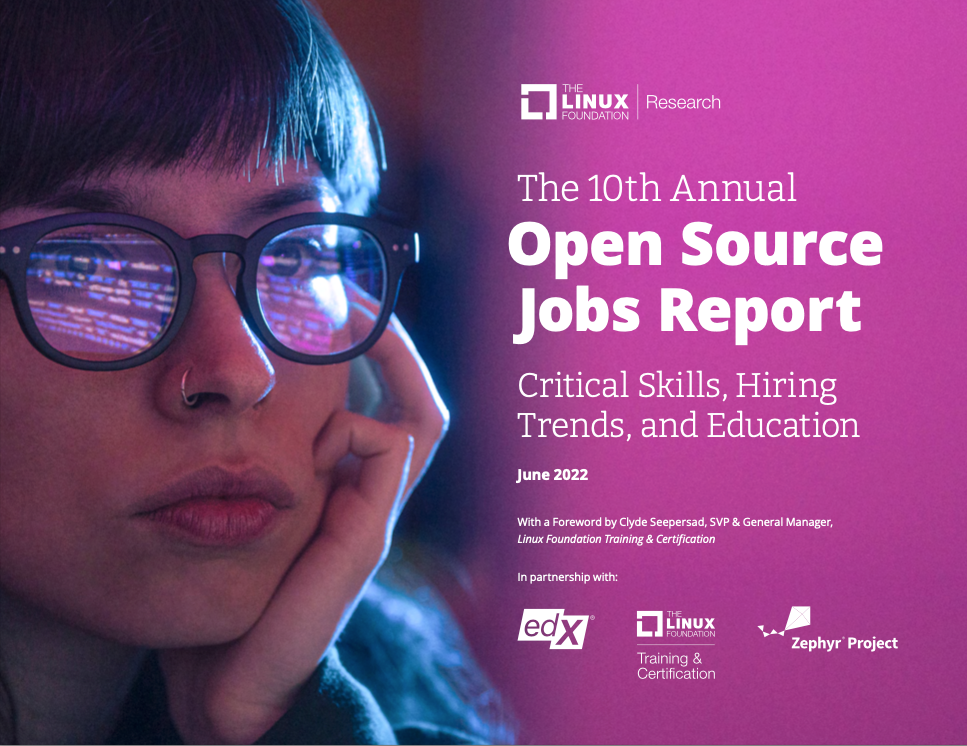Written by Dan Brown, Senior Manager, Content & Social Media, Linux Foundation Training & Certification

The need for open source talent is strong in light of continuing cloud adoption and digital transformation across industries. As the COVID pandemic wanes, both retention and recruitment have become more difficult than ever, with 73% of professionals reporting it would be easy to find a new role and 93% of employers struggling to find enough skilled talent. Although the majority of open source professionals (63%) reported their employment did not change in the past year, one-in-three did report they either left or changed jobs, which puts additional pressure on employers trying to hold onto staff with necessary skills. While this may not reach levels of a “Great Resignation”, this turnover is putting more pressure on companies.
“Every business has struggled with recruiting and retaining talent this past year, and the open source industry has been no different,” said Jim Zemlin, the Linux Foundation Executive Director. “Organizations that want to ensure they have the talent to meet their business goals need to not only differentiate themselves to attract that talent, but also look at ways to close the skills gap by developing net new and existing talent. This report provides insights and actionable steps they can take to make that happen.”
The tenth annual Open Source Jobs Report examines trends in open source careers, which skills are most in-demand, the motivation for open source professionals, and how employers attract and retain qualified talent. Key findings from the Open Source Jobs Report include:
- There remains a shortage of qualified open source talent: The vast majority of employers (93%) report difficulty finding sufficient talent with open source skills. This trend is not going away with nearly half (46%) of employers planning to increase their open source hiring in the next six months, and 73% of open source professionals stating it would be easy to find a new role should they choose to move on.
- Compensation has become a greater differentiating factor: Financial incentives including salary and bonuses are the most common means of keeping talent, with two-in-three open source professionals saying a higher salary would deter them from leaving a job. With flex time and remote work becoming the industry standard, lifestyle benefits are becoming less of a consideration, making financial incentives a bigger differentiator.
- Certifications hit new levels of importance: An overwhelming number of employers (90%) stated that they will pay for employees to obtain certifications, and 81% of professionals plan to add certifications this year, demonstrating the weight these credentials hold. The 69% of employers who are more likely to hire an open source professional with a certification also reinforces that in light of talent shortages, prior experience is becoming less of a requirement as long as someone can demonstrate they possess the skills to do the job.
- Cloud’s continued dominance: Cloud and container technology skills remain the most in demand this year, with 69% of employers seeking hires with these skills, and 71% of open source professionals agreeing these skills are in high demand. This is unsurprising with 77% of companies surveyed reporting they grew their use of cloud in the past year. Linux skills remain in high demand as well (61% of hiring managers) which is unsurprising considering how much Linux underpins cloud computing.
- Cybersecurity concerns are mounting: Cybersecurity skills have the fourth biggest impact on hiring decisions, reported by 40% of employers, trailing only cloud, Linux and DevOps. Amongst professionals, 77% state they would benefit from additional cybersecurity training, demonstrating that although the importance of security is being recognized more, there is work to be done to truly secure technology deployments.
- Companies are willing to spend more to avoid delaying projects: The most common way to close skills gaps currently according to hiring managers is training (43%), followed by 41% who say they hire consultants to fill these gaps, an expensive alternative and an increase from the 37% reporting this last year. This aligns with the only 16% who are willing to delay projects, demonstrating digital transformation activities are being prioritized even if they require costly consultants.
This year’s report is based on survey responses from 1,672 open source professionals and 559 respondents with responsibility for hiring open source professionals. Surveys were fielded online during the month of March 2022.
Download the report here for free.